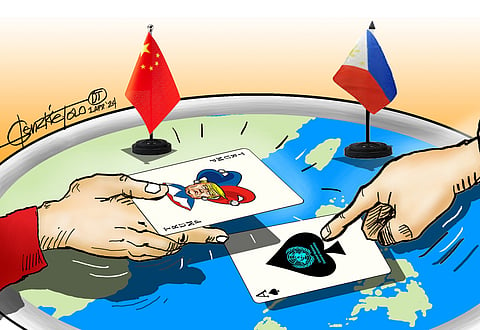
- NEWS
- the EDIT
- COMMENTARY
- BUSINESS
- LIFE
- SHOW
- ACTION
- GLOBAL GOALS
- SNAPS
- DYARYO TIRADA
- MORE

Since August last year, the Senate has adopted a resolution seeking Department of Foreign Affairs (DFA) action to bring the increasingly belligerent actions of China before the United Nations General Assembly (UNCA), the highest governing body of the international organization.
In a unanimous vote, the senators adopted Senate Resolution 718, calling on the government to raise the issue of Beijing’s bullying and acts of provocation in the West Philippine Sea before the UNGA.
Thus far, the DFA has been stuck in a cycle of issuing note verbales, filing diplomatic protests, and summoning the Chinese Ambassador, Huang Xilian, which Beijing merely shrugged off.
SR 718 urged the filing of a UNGA resolution to call “for the cessation of all activities that harass Philippine vessels and violate the Philippines’ established rights in the West Philippine Sea (WPS) and pursuing such other diplomatic modes as the Department of Foreign Affairs may deem appropriate and necessary.”
The resolution said the territorial dispute must be addressed in accordance with the United Nations Convention on the Law of the Sea (UNCLOS) and the 2016 ruling of the Permanent Court of Arbitration based in The Hague invalidating China’s massive nine-dash line claim and reaffirming the Philippines’ maritime entitlements.
The resolution cited the necessity of “utilizing international fora to rally multilateral support for the enforcement of the Hague Ruling and raise awareness on the real situation in the WPS.”
It also called for “engaging like-minded countries in various international organizations, meetings and other fora to call on China to respect the Hague Ruling and the UNCLOS,” the resolution stated.
While the administration may still have the opportunity for negotiations with China, the Asian giant’s actions thus far have indicated the futility of a dialogue in which Manila and Beijing are on the same page.
Beijing raises two difficult conditions before the start of negotiations: that the nine-dash line be the talks’ parameter and that third-party involvement should be avoided. This means that the United States will not have any role in the discussions.
In contrast, the Philippines holds Beijing, as a signatory of UNCLOS, to recognize the arbitral ruling guided by the UN maritime rules.
The DFA is working against time in seeking UNGA intervention since the equation in the region would likely change in a likely scenario where Donald Trump retakes the White House in November.
The US is expected to become more inward-looking again, and its involvement in Indo-Pacific affairs could diminish under a new Trump administration
Shortly after his first inauguration, Trump withdrew the United States from the Trans-Pacific Partnership free trade agreement (TPP), which was meant to address China’s growing economic influence in the region.
China then developed the Belt and Road Initiative, which pulled all participants from the TPP, which died naturally without the US.
Those previous developments raised concerns among US allies in the Asia-Pacific about whether a Trump victory would be a disastrous retreat from support in the region.
Building stronger relations with other allies, such as Japan and Australia, will cushion the impact of a US backpedal, but bringing China’s bullying acts before the UNGA would be a show of resolute action.
The government must not waver in a swift and determined step of involving the UN in the dispute since lives, particularly those of Navy sailors, have been put at risk.
